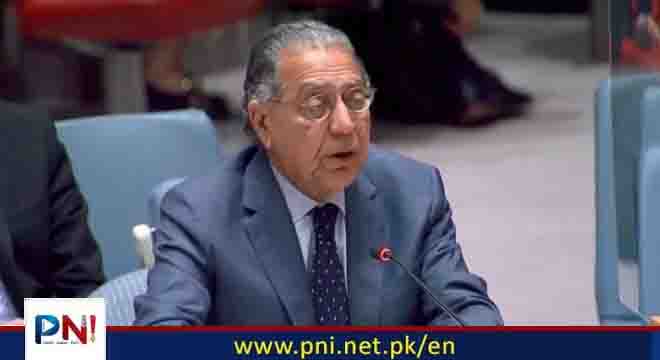UNITED NATIONS, Sep 10 : Pakistan has called for strengthening the role and capacity of UN peacekeeping in hotspots around the world, proposing that the Security Council should create effective political mechanisms to promote peace agreements among parties to the conflict.
Speaking in the 15-member Council as it reviewed UN peacekeeping operations, Ambassador Munir Akram pointed out that such a mechanism would require greater cooperation among Security Council members, especially the permanent ones, notwithstanding their geopolitical rivalries.
The Pakistani envoy said that peacekeeping missions should also put greater emphasis on promoting local peace arrangements at the community level to reduce violence, citing the successful efforts of the Pakistani peacekeepers in restive Abyei, an area disputed by South Sudan and the Sudan,
Monday’s Council meeting was organized by Slovenia as the rotating President of the UN Security Council for the month of September.
At the outset, Ambassador Akram said Pakistan has a long and close involvement with United Nations peace operations.
Pakistan, he said, is host to one of the first United Nations missions — the UN Military Observer Group in India and Pakistan (UNMOGIP), which was established in 1949 to monitor the ceasefire along the line of control (LoC) in disputed Jammu and Kashmir.
For its part, Pakistan has also deployed 230,000 peacekeepers in 46 missions and has lost 181 peacekeepers in the service of international peace and security, Ambassador Akram added.
In today’s day and age, he said, United Nations peacekeeping missions find themselves facing new and growing challenges, including violence an chaos spread by terrorists, involvement of organized criminal networks in illegal extraction of resources and criminal activities; external interventions in local conflicts; limitations imposed on the resources for UN peacekeeping and erosion of unified support from member States, especially the Council’s permanent members.
The international community, especially the United Nations and the Security Council, must extend full support to those regional organizations — like the African Union — who are prepared to take more robust operations where necessary to enforce peace, Ambassador Akram said.
Opening the debate, Jean-Pierre Lacroix, UN Under-Secretary-General for Peace Operations, underscored the need for greater political support and resources for UN peacekeeping mission to carry out their duties safely as conflicts grow more complex and armed groups increasingly weaponize low-cost technologies like improvised explosive devices (IEDs) and drones.
He said that UN operations “can only ever be as strong” as the collective support of nations.
“As geopolitical tensions have mounted, including here in this Council, and amid shifting global and regional dynamics, peacekeeping operations are increasingly unable to rely on Member States to act in a strong, unified manner to support peacekeeping efforts they are mandated to support.”
Today, Lacroix said, peacekeepers face challenges ranging from transnational organized crime, illegal resource exploitation, climate change impacts, the proliferation of cheap weaponized technology, and targeted disinformation campaigns.
“Despite all these challenges, today over 70,000 peacekeepers bravely continue their vital work. Each day, they make a difference in protecting civilians, clearing mines and explosive remnants of war, monitoring fragile ceasefires and preventing escalation of hostilities,” he added.
Follow the PNI Facebook page for the latest news and updates.









